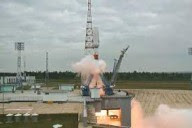
The ambitious Luna-25 mission from Russia has failed after the spacecraft spun out of control and collided with the Moon’s surface. As the nation’s state space corporation, Roskosmos, announced the tragic incident, this marks a disappointing end to Russia’s first moon mission in almost fifty years.
On Saturday, as the Luna-25 spacecraft was being placed into its pre-landing orbit, it suffered a catastrophic failure shortly after a crucial manoeuvre. Roskosmos revealed in a statement that contact with the spacecraft had been lost because of an unexpected problem during this crucial part of the mission.
In their official statement, Roskosmos conveyed the tragic conclusion of the Luna-25 mission: “The apparatus moved into an unpredictable orbit and ceased to exist as a result of a collision with the surface of the Moon.” The scientific and space communities worldwide are in disbelief following this abrupt and unexpected conclusion, which represents a significant setback for Russia’s aspirations for space exploration.
Roskosmos made the following official statement on Telegram: “On August 19, it was planned to issue an impulse to form the Luna-25 spacecraft’s pre-landing elliptical orbit in accordance with the flight program. The Luna-25 spacecraft’s communication was cut off around 14:57 Moscow time. The efforts made on August 19 and 20 to locate the device and communicate with it were unsuccessful.
The issue of explaining the circumstances surrounding the loss of the Moon will be handled by a specially created interdepartmental commission, it was added.
A key component of Russia’s efforts to revive its lunar exploration program was the Luna-25 mission. The spacecraft was made to land on the south pole of the moon, which is of particular interest to researchers because it may contain water ice, an essential resource that could be essential for upcoming human missions to the Moon and beyond.
The unsuccessful mission was intended to pave the way for more complex lunar endeavours, such as the collection and return of lunar soil samples, by laying the groundwork for the upcoming Luna-26 and Luna-27 missions.
After nearly 50 years since the last successful Soviet lunar mission, Roskosmos had initially described the Luna-25 mission as a significant turning point in Russia’s space exploration history. The incident has not only dashed these goals but also sparked debate regarding the technical difficulties and unforeseen difficulties that space agencies encounter when attempting such difficult tasks.
See also: Most distant black hole discovered by a Webb Space Telescope
